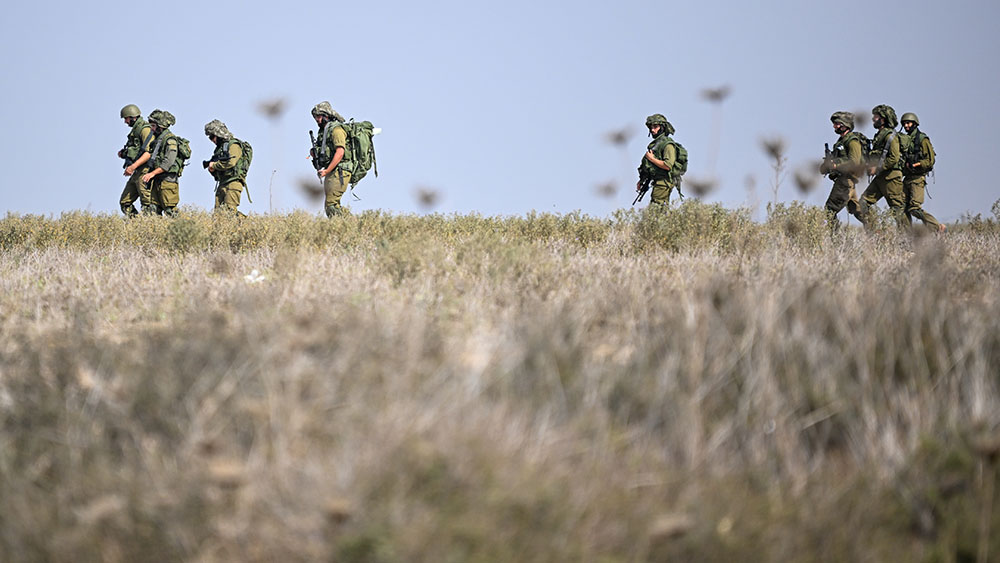Scavenging and the Law, by JRRT
by JRRT, Survival Blog:
 There’s a lot to criticize about survival-themed movies, to the point where the only value most of them have is just to get all of us thinking about “what if,” and to entertain us in the process. But the trope that bothers me more than any other is the portrayal of scavenging. In survival movies, the heroes find caches of cool stuff, help themselves to fully stocked but deserted grocery stores, and appropriate vehicles. Survival almost looks fun! Who hasn’t fantasized about being able to have free reign to grab whatever they want from store shelves? As enjoyable as it is to watch movie heroes find Hummers with duffel bags full of sweet guns, I believe it does a lot to harm right thinking about survivalism. I’m going to outline a code of ethics for scavenging, and then discuss why scavenging is probably the most stupid possible survival strategy.
There’s a lot to criticize about survival-themed movies, to the point where the only value most of them have is just to get all of us thinking about “what if,” and to entertain us in the process. But the trope that bothers me more than any other is the portrayal of scavenging. In survival movies, the heroes find caches of cool stuff, help themselves to fully stocked but deserted grocery stores, and appropriate vehicles. Survival almost looks fun! Who hasn’t fantasized about being able to have free reign to grab whatever they want from store shelves? As enjoyable as it is to watch movie heroes find Hummers with duffel bags full of sweet guns, I believe it does a lot to harm right thinking about survivalism. I’m going to outline a code of ethics for scavenging, and then discuss why scavenging is probably the most stupid possible survival strategy.
There are already some ancient laws that deal with abandoned property. The legal elements of abandoned property are that 1) the owner intended to leave the property, 2) but is in a condition that it is apparent that he has no intention to return or claim it. I’d modify this to add to this a Reasonable Man standard which so often comes up in law. Would a reasonable man consider it likely that the owner is going to return? I want to add this because it could be many people initially plan to return, but eventually it becomes clear they never will. These questions could be pretty opaque if large swathes of the country turn into a no man’s land. Let’s consider a few scenarios.
SCAVENGING HYPOTHETICALS
Scenario 1.) You live in Florida, for some reason. A large hurricane is on its way, and your neighbors head for the hills…errr higher areas of swamp. You, the tough prepper decides to ride it out. But as you sit in the eye of the storm, you feel like a drink and you know your next door neighbor has some 25 year old scotch. Is your neighbor’s house abandoned? Obviously not, as they plan to return after the storm. You’ll have to spend the rest of the storm thirsty.
Scenario 2.) A mini ice age happens as result of a massive volcanic eruption in Iceland. People begin to trickle out of your increasingly cold climate farming town, because nothing will grow. After a year, unoccupied houses are everywhere. Are these houses fair to poke around in for useful things? What if everyone expects the climate to return to normal in a year? But what if it has been five years and there are no signs of things returning to normal? This is where the “reasonable man” standard comes in.
Scenario 3.) JWR’s big Crunch happens: A few miles from your house is a highway that is now a parking lot. Hundreds of cars sit where they ran out of gas, their occupants long gone on foot. It’s six months into the crunch and you have no idea if there is even a functional refinery left in the whole country. Are the vehicles fair game to salvage for waste oil and parts for the sweet wind turbine you’re building? It seems fair to me.
Scenario 4.) A slightly different scavenging related scenario: It is present day, and you’re elk hunting somewhere in the Western US. But you get sidetracked in the mountains and get caught in a snow storm. Disoriented and lost, you stumble down the mountains, and find an unoccupied cabin. You know that you will die if you don’t get warm (you didn’t properly plan for this eventuality), so you break into the cabin, light a fire, and even find some cocoa mix. In the morning with the weather clear, you write a note to leave on the table with your contact information, a profuse apology, and a promise to pay whatever the cabin owner asks. As of right now, in normal times, this scenario would be acceptable so you can save your life. But what about in not so normal times?
There will be many people who will probably be able to correctly claim that “appropriating” supplies is their only way to survive. The difference is, by doing something like this in a nationwide survival scenario, you may be hurting others chances for survival in a way you are not in normal times. Besides that, in normal times you have the ability to repay what you borrowed, in the future you may not.
These questions may seem irrelevant to some, because sadly there are too many people who gleefully anticipate collapse and the ensuing free-for-all. But I say, there is no survival situation that changes your duty to follow God’s laws. We will never have a right to steal and we must put all such things from our minds. Our preparations are a moral duty precisely so that we aren’t tempted to steal or worse to feed our families when the terrible times come.
With the morality of scavenging thoroughly discussed, I’ll now show why it is the most stupid thing to do anyways, even from a purely practical standpoint, with possible exceptions for certain machinery parts and building materials, and then only after things settle down.
WHY SCAVENGING IS A STUPID IDEA
Why would anyone willingly scavenge in the first place? It’s the diametric opposite of preparedness, a failure to plan. Fundamentally, there shouldn’t be anything you need to scavenge for.
There is plenty of discussion of just in time supply chains in prepper circles. The nation’s supplies, as they exist, are much more like a firehose then a reservoir. As long as the firehose stays on, there is plenty. But once it turns off, the water is gone immediately. Scavenging from stores is a fool’s game, as about every useful thing from any store that actually carries useful things will be empty within hours. If you don’t have it when TSHTF you’ll probably not have it for a long time. Speaking of which, go into most stores and there is very little you’d want for your preps. Even a store like Lowes has quite bit of stuff that you wouldn’t cross the street to pick up if the power went off for good. Wal-Mart? There are few useful things there, but not much. So we see that stores will be barely worth visiting.
What about abandoned houses? There are many problems with this as well. The first being, Americans’ houses reflect our stores; most contain nothing useful. If you live in the suburbs and your whole neighborhood was abandoned, I bet you could look through 100 houses and not find five things worth keeping, even if people didn’t take their most useful things on the way out the door. I scarcely exaggerate: of the following list,how many would you find in the average suburban house? Cast iron skillet, wool blanket, duct tape, .22 LR cartridges, a can of stew. There are a lot of people now who don’t have so much as a flashlight or hammer in their house.
People eat out and take out more than ever, so already anemic larders are shrinking further. Far from being treasure troves of goodies, scavenging from these houses will be labor intensive and a waste of calories. What is the energy return on investment for checking 10 houses and finding one can of tomato soup? To highlight my point farther, the furniture in most houses is particle board Ikea stuff, so you couldn’t even re-purpose it or burn it for firewood!
Around here, we know that expiration dates marked on packaged food aren’t genuine expiration dates. The caveat is, food needs to be stored properly. Abandoned pantries will be subject to a lot of moisture and temperature swings, and canned food that is frozen and refrozen is probably going to be compromised. Dry goods will mold or be eaten by vermin.
If things get sporting, our procedures for answering a knock on the door may change. We may not answer the door at all. What happens when you decide a house is abandoned, go inside, and find a group of people who are not happy to see you trespassing?
LACK OF PLANNING IS NOT A PLAN
But by far the best reason not to lean on scavenging is that there are millions of morons out there whose “plan” consists of doing just this. They think that they’ll be able to grab what they want and hole up at some rich guy’s mountain cabin. You don’t want to be out with the Free Stuff Army. Rather, you want to be at your retreat location. It doesn’t help that too many “preppers” are really only prepared in the firepower department. Crowds of people who have plenty of guns and no extra calories aren’t people that I want to be near.
Hopefully, the foregoing convinces everyone of the folly of (most) scavenging. Please encourage everyone you can to prepare now, especially regarding food storage. Godspeed.
Loading...



